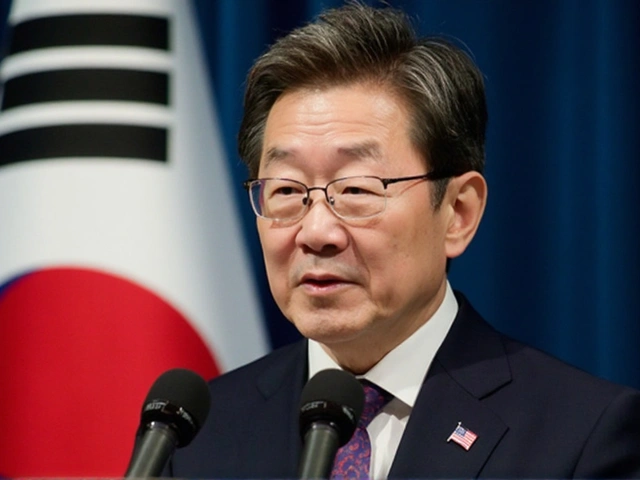Supreme Court Confirms Usman Ododo's Victory as Kogi Governor
In a landmark decision, the Supreme Court has upheld the election of Usman Ododo as the governor of Kogi State, dismissing the appeal brought forth by Murtala Ajaka of the Social Democratic Party (SDP). The ruling brings to an end a contentious legal battle that ensued following the November 11, 2023, governorship election. Ododo, who ran on the platform of the All Progressives Congress (APC), was declared the winner by the Independent National Electoral Commission (INEC) with 446,237 votes. Ajaka, who came in second with 259,052 votes, and Dino Melaye of the Peoples Democratic Party (PDP), who garnered 46,362 votes, contested the results.
Ajaka and his party initiated a series of legal challenges against Ododo and the APC, bringing their case before the Kogi State Governorship Election Petitions Tribunal and subsequently the Court of Appeal. Their chief allegations included that Ododo was unqualified to contest due to alleged certificate forgery, that his sponsorship by the APC was invalid and unconstitutional, and that the election was marred by over-voting and substantial non-compliance with the Electoral Act.
Allegations and Legal Battles
From the outset, Ajaka and the SDP argued that Usman Ododo’s candidacy breached several legal and procedural norms. They contended that Ododo’s educational qualifications were forged and that he did not meet the constitutional requirements for the governorship. Additionally, they claimed that there were significant irregularities during the voting process, including over-voting and manipulations inconsistent with the provisions of the Electoral Act.
However, both the Governorship Election Petitions Tribunal and the Court of Appeal dismissed these allegations. In their rulings, the judges noted that the petitioners failed to present conclusive and credible evidence to back their claims. The tribunal emphasized that issues relating to forgery and the qualifications of a candidate should be addressed as a pre-election matter rather than a post-election contestation. They upheld Ododo's victory, stating that the electoral process, despite its imperfections, had substantially complied with the standing legal framework.
Supreme Court's Verdict
After hearing the appeal, the Supreme Court reserved judgment to deliberate on the intricate legal issues raised by the petitioners. When the judgment was delivered, the court affirmed the decisions of the lower courts, thereby cementing Ododo's position as the democratically elected governor of Kogi State.
In their ruling, the justices of the Supreme Court reiterated the necessity for substantial evidence to overturn an election. They found that Ajaka and the SDP had not sufficiently demonstrated that the alleged irregularities and qualifications issues were significant enough to affect the outcome of the election. The Supreme Court's judgment emphasized the principle that purely administrative or procedural irregularities, in the absence of clear and compelling evidence of voter disenfranchisement or fraudulent intent, would not suffice to nullify an election.
Implications for Kogi and Beyond
The ruling of the Supreme Court has far-reaching implications, not only for Kogi State but also for the broader Nigerian electoral landscape. For Kogi, the confirmation of Ododo's governorship provides a semblance of political stability, allowing the newly inaugurated administration to move forward with its governance agenda. The decision reinforces the legitimacy of the electoral process and the rule of law, underscoring the judiciary’s role in upholding democratic principles.
Nationwide, this judgment may serve as a precedent for future electoral disputes. It sends a clear message about the burden of proof required to contest election outcomes based on allegations of forgery and procedural flaws. The scrutiny applied by the courts in this high-profile case could guide legal strategies and expectations for candidates and political parties in subsequent elections.
Responses and Reflections
Reactions to the Supreme Court's decision have been mixed. Supporters of the APC and Ododo have hailed the ruling as a victory for democracy and a validation of the people’s choice. Festivities marked by jubilation erupted in various parts of Kogi State, as Ododo's supporters celebrated the judicial endorsement of his mandate.
Conversely, Ajaka and his followers expressed disappointment but pledged to continue their political engagement through lawful and democratic means. Ajaka, while acknowledging the Supreme Court’s judgment, reiterated his commitment to the democratic process and vowed to prepare for future political engagements. He called on his supporters to remain peaceful and law-abiding, emphasizing the importance of resilience in the face of political adversity.
Conclusion
The Supreme Court's decision to uphold Usman Ododo’s governorship and dismiss Murtala Ajaka’s appeal marks the end of a significant electoral controversy in Kogi State. While the judgment reinforces the existing legal framework governing elections in Nigeria, it also highlights the ongoing challenges and complexities of the nation’s electoral process. As the dust settles, the focus will shift towards governance and the fulfillment of electoral promises, with the hope of fostering development and stability in Kogi State.







Nasrin Saning
August 23, 2024 AT 20:31It's good to see the courts finally bring clarity to Kogi's political scene. The process may not be perfect but respect for the verdict is essential.
gaganpreet singh
August 24, 2024 AT 10:24The Supreme Court's decision should be hailed as a triumph of constitutional order, not merely as a political victory for any party. It reaffirms that the rule of law supersedes partisan ambitions and reminds us that every citizen must uphold the sanctity of the electoral process. When judges meticulously examine evidence and reject baseless claims, they protect democracy from the corrosive effects of unchecked manipulation. The allegations of forgery and over‑voting presented by the opposition were, upon close scrutiny, found lacking in substantive proof, which demonstrates the folly of seeking to overturn the will of the people through judicial theatrics. Moreover, the judiciary's resolve to demand concrete evidence before interfering with the mandate of the electorate sets a precedent that will deter future frivolous petitions. It is incumbent upon political actors to recognize that the courts are not a battleground for revenge but a venue for justice, and that any attempt to weaponize them for personal gain erodes public trust. The electorate’s voice, expressed through the ballot, must remain the ultimate arbiter, and any effort to diminish that voice is an affront to the very ethos of democracy. Citizens must also reflect on their responsibility to support transparent processes rather than indulge in conspiratorial narratives that undermine stability. The ramifications of this ruling extend beyond Kogi; they echo across the nation, reinforcing that legal frameworks must be respected. In this light, the decision serves as a moral compass for all political stakeholders, urging them to pursue integrity over intrigue. The parties involved should channel their energies into constructive governance, focusing on development and service rather than perpetual litigation. It is a reminder that the pursuit of power must be balanced with ethical conduct, and that the courts will not be swayed by rhetoric devoid of evidence. The dismissal of the appeal also signals to the international community that Nigeria remains committed to upholding democratic principles, which may bolster investor confidence. As we move forward, let us all-politicians, civil society, and citizens alike-commit to a culture of accountability, where the rule of law is not merely a slogan but a lived reality. Finally, the Supreme Court's firm stance should inspire future generations to value justice, to cherish democratic institutions, and to understand that the health of a nation depends on the collective adherence to lawful processes.
Urmil Pathak
August 25, 2024 AT 00:17Yes the court decision clears things up. It shows the system works when evidence is clear.
Neha Godambe
August 25, 2024 AT 14:11While I respect the court's authority, I must stress that the opposition's attempts were nothing short of a political theater designed to destabilize Kogi; such tactics, though aggressive, will only be tolerated insofar as they remain within the bounds of constitutional propriety, and any further descent into baseless accusations will be met with unwavering condemnation from the legal community.
rupesh kantaria
August 26, 2024 AT 04:04In view of the Supreme Court's adjudication, it is manifest that the jurisprudential standards were adhered to, notwithstanding certain procedural irregularities which, albeit minor, could be construed as inadvertent oversights; thus, the veracity of the election outcome stands affirmed, and any dissent must be grounded in factual substantiation rather than speculative conjecture.
Nathan Tuon
August 26, 2024 AT 17:57Let's channel this moment of resolution into positive action for Kogi's future. The legal closure provides a stable foundation upon which we can build development initiatives. United effort will translate this judicial certainty into tangible progress for the citizens.
shivam Agarwal
August 27, 2024 AT 07:51Understanding the disappointment felt by supporters of the contested candidacy is important; however, the reassurance provided by the court's thorough examination should serve as a reminder that our democratic institutions are capable of self‑correction. By acknowledging both the grief and the legitimacy of the decision, we foster a more resilient political environment.
MD Imran Ansari
August 27, 2024 AT 21:44Wow, the Supreme Court really dropped the mic on this one! 🎤⚖️ It's a win for legal clarity and a reminder that drama belongs on stage, not in the ballot box. Kudos to everyone who respects the verdict! 🙌
walaal sanjay
August 28, 2024 AT 11:37What a relief, finally the courts have cut through the nonsense, the fraudsters, the lies, the endless distractions, and confirmed the rightful winner, securing the future of our great nation, our beloved Kogi, and preserving the sanctity of the democratic process!
Umesh Nair
August 29, 2024 AT 01:31lol honestly i think the whole thing was a staged drama lol people just love a good scandal more than actual governance.
kishore varma
August 29, 2024 AT 15:24Interesting how the judicial system handled this, kinda shows the balance between law and politics. 🤔✌️
Kashish Narula
August 30, 2024 AT 05:17The court's decision indeed shows balance-on one hand, it upholds legal standards; on the other, it reminds politicians that they must abide by the same rules, therefore fostering a healthier political climate.
smaily PAtel
August 30, 2024 AT 19:11It is evident, upon rigorous analysis, that the Supreme Court's affirmation not only validates the electoral outcome but also establishes a jurisprudential benchmark, which, when scrutinized, reveals the robustness of our constitutional mechanisms, thereby discouraging frivolous challenges, and reinforcing democratic stability.
Hemanth NM
August 31, 2024 AT 09:04The ruling brings much‑needed stability.
rin amr
August 31, 2024 AT 22:57From an intellectual standpoint, the Supreme Court's resolution transcends mere procedural adjudication; it epitomizes the confluence of legal theory and practical governance, thereby manifesting an exemplar of judicial excellence that should be studied in comparative constitutional discourse.
Jai Bhole
September 1, 2024 AT 12:51Truth be told, the court's verdict is the ultimate proof that our nation stands on the pillar of order, not chaos, and anyone who doubts this is simply blinded by ignorance.
rama cs
September 2, 2024 AT 02:44In the grand schema of democratic praxis, the adjudicative affirmation serves as a pivotal node, recalibrating the epistemic vectors of political legitimacy, whilst the dissenting factions, entrenched in performative opposition, inadvertently perpetuate systemic dissonance.
Monika Kühn
September 2, 2024 AT 16:37Oh great, another Supreme Court decision-just what we needed to keep the political theater thriving.
Surya Prakash
September 3, 2024 AT 06:31Respecting the court's ruling is simply the right thing to do.